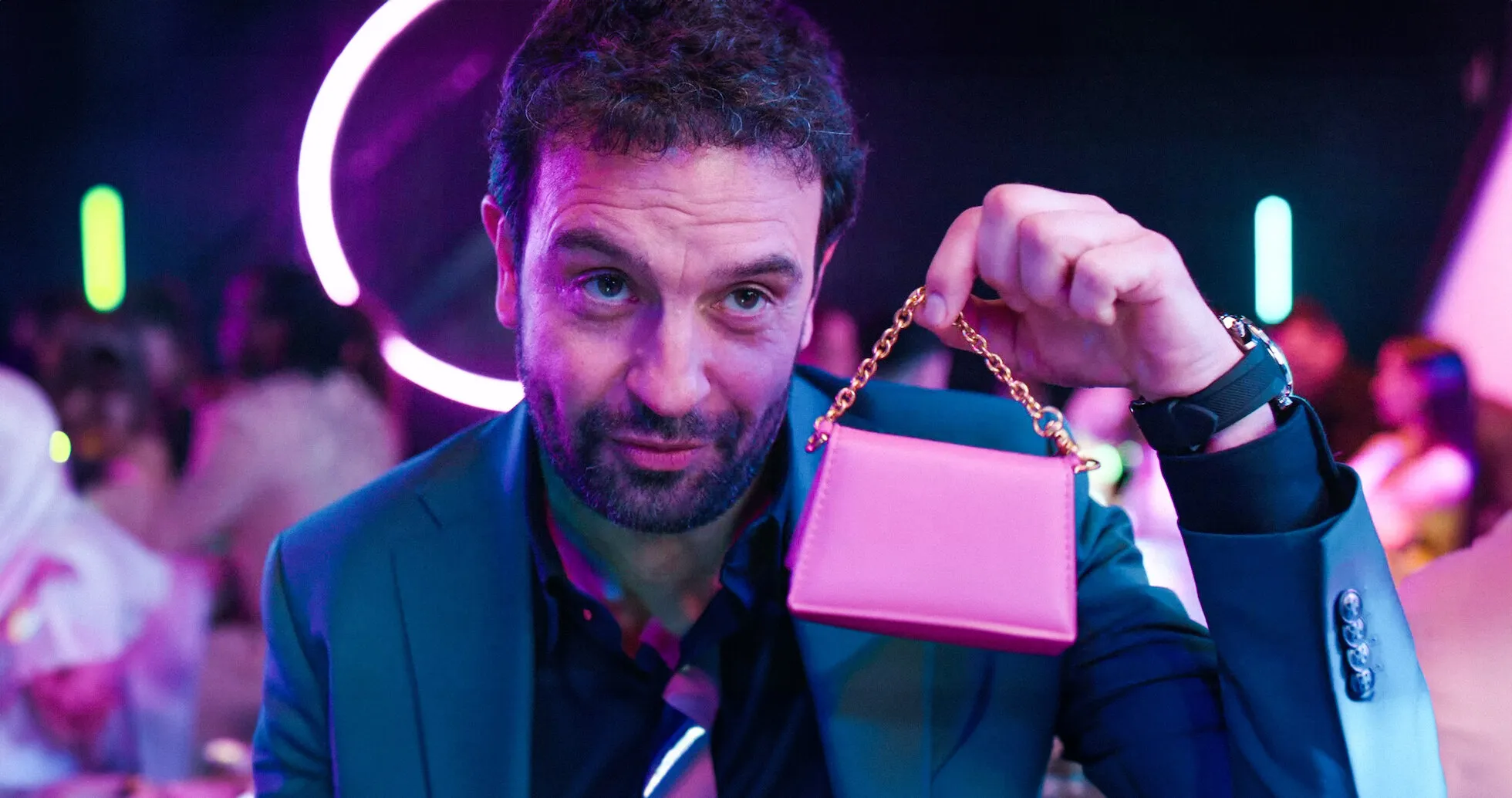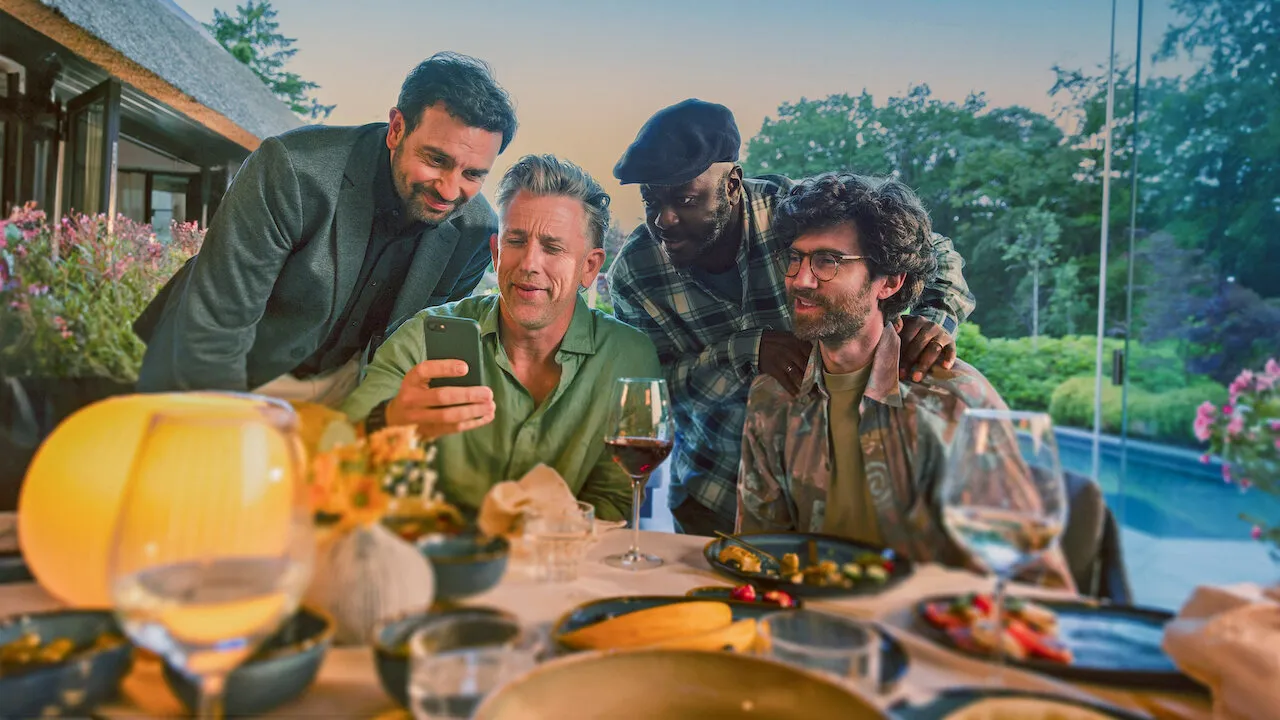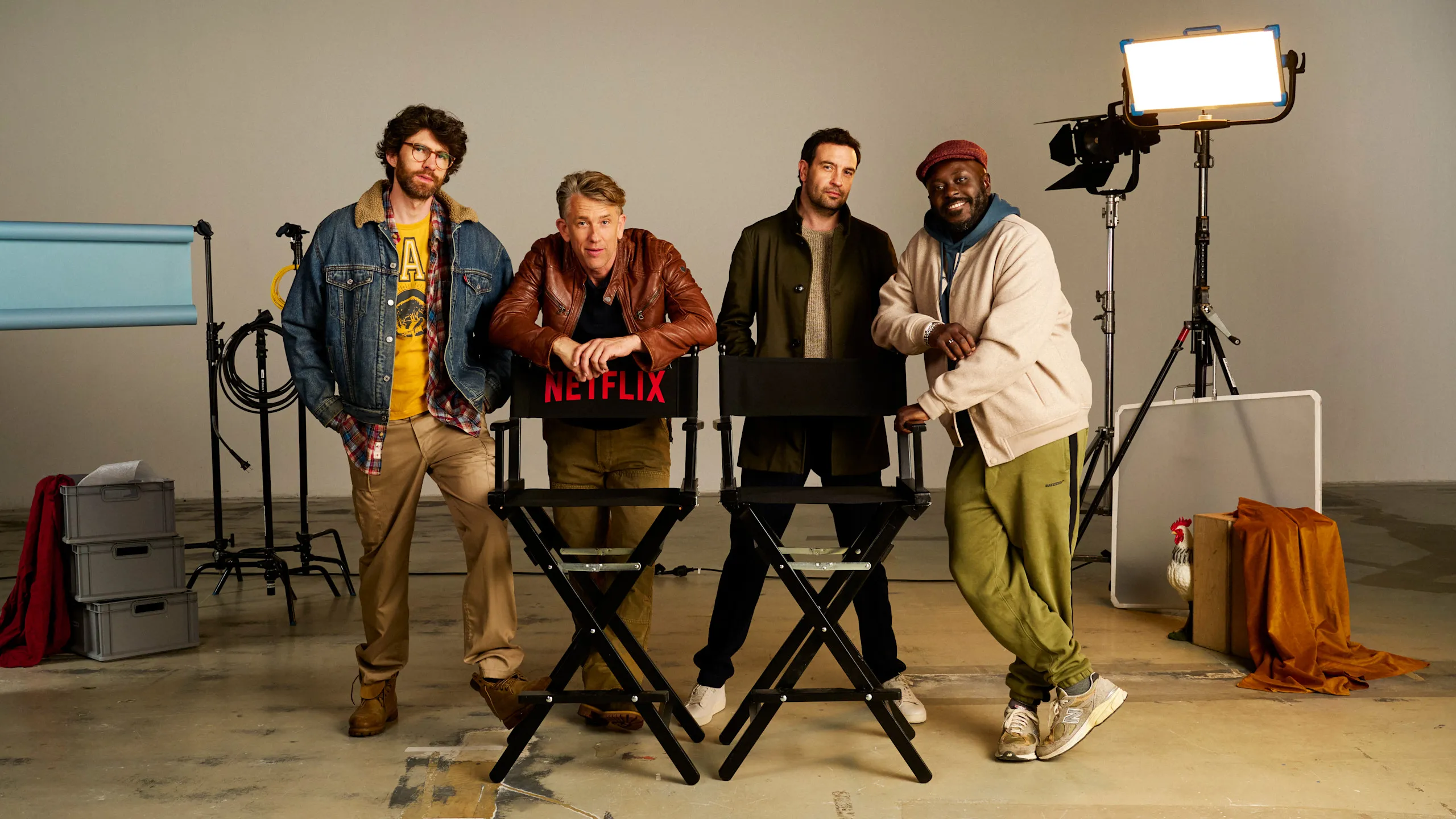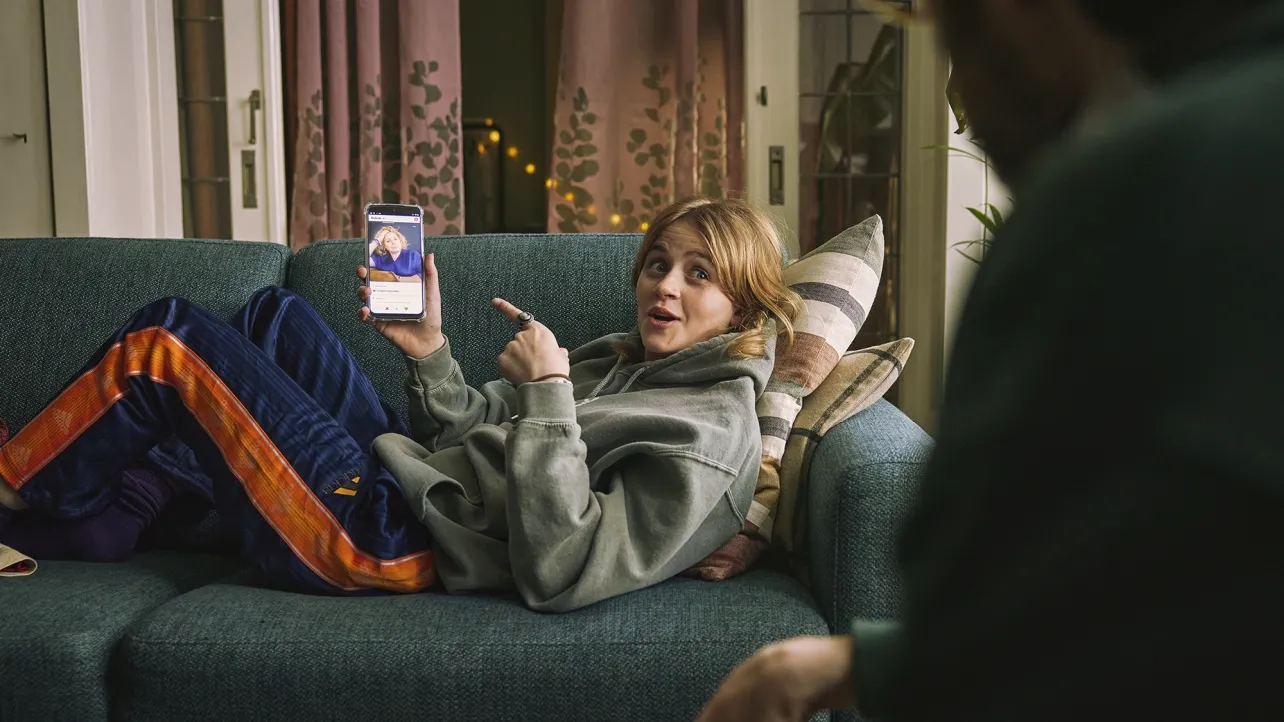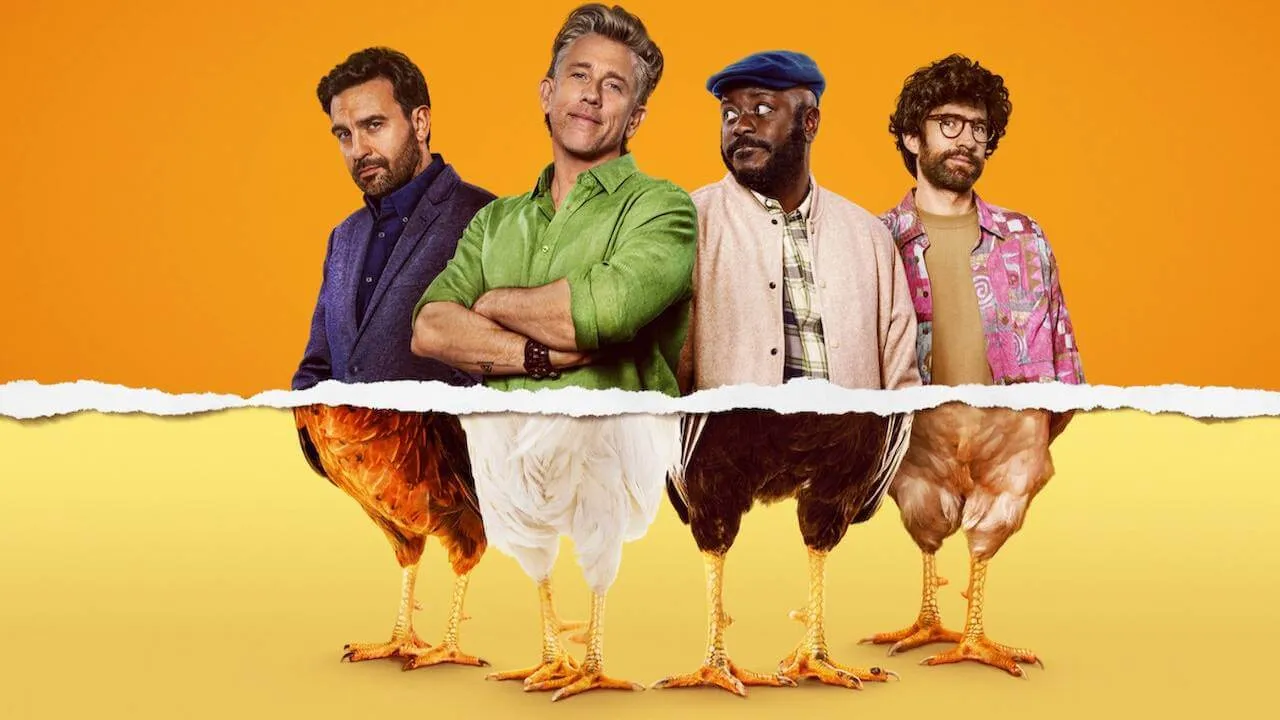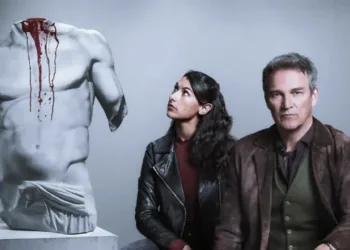Roosters launches in the Netherlands, tracking four longtime friends—Mike, Ivo, Danny and Greg—through storms of shifting gender roles. It opens at a seminar on toxic masculinity, an ironic rite of passage where reluctant attendees confess traits they once dismissed. Mike, ousted as head of network content in favor of a younger female executive, grapples with bruised pride as his partner, Stevie, reinvents herself on social media to keep their household afloat.
Ivo faces parental upheaval when his teenage daughter returns home and his ex arranges dating experiments via swipe culture. Danny prepares a marriage proposal hidden inside molten chocolate until his partner proposes an open relationship instead. Greg, who prides himself on progressive ideals, stumbles into an embarrassing domestic incident involving experimental adult toys.
Over six brisk episodes, Roosters uses realistic Dutch settings—from minimalist offices to warm kitchens—to frame discomfort and connection. Moments of cringe and solidarity intersect: a dinner-party meltdown over gendered assumptions leads to an uneasy reckoning by a pool. Naturalistic dialogue rings true, blending irony with empathy. The series examines how friendship endures when familiar roles collapse, raising questions about identity, power and respect in an era that demands men rewrite old scripts.
Structure of Midlife Reckoning
From its first scene—a seminar on shedding toxic masculinity—Roosters sets a clear course. That gathering functions as a catalyst: four men admit flaws they never chose to see. Mike loses his content director post to a younger woman, trapping his pride in crisis. Ivo returns home to find his daughter reclaiming space in his apartment while his ex enlists Tinder to find him dates.
Danny’s romantic proposal plan is upended when his partner demands an open relationship. Greg, who prides himself on progressive ideals, finds his marriage strained by an ill-fated attempt at bedroom experimentation. Each man arrives at the same seminar marked by a private upheaval, and from there the series builds its ensemble drama.
The six-episode arc moves with sharp rhythm. Episode 1 introduces the seminar, Mike’s firing and the private stakes each character hides. Episodes 2 and 3 deepen conflict: Mike wrestles with unemployment while Stevie reinvents herself online; Ivo’s first swipe-date lands in mishap; Danny’s ring in molten cake meets unexpected terms; Greg and Merel’s bedroom misadventure explodes during a parent-teacher scene.
Episode 4 shifts the center of gravity to a dinner-party meltdown that pulls every storyline together. In Episodes 5 and 6 each protagonist confronts fallout: Mike launches his own back-to-basics workshop; Danny faces the cost of modern romance; Ivo tentatively reenters dating; Greg must own his blind spots. The final poolside tableau offers shared reflection without tidy resolutions.
Roosters trades rapid-fire edits and mini-cliffhangers for moments of candid pause. Laughs spring from physical comedy and sharp irony—like the vibrating toy exposed at a school meeting—then give way to quiet character confessions. Scene lengths vary, so that humorous set pieces can segue into introspective beats with barely a cut.
Narrative voice remains anchored in an ensemble gaze. Most scenes adopt a third-person view, yet sudden close-ups reveal private fractures. That mix of group energy and intimate focus keeps a consistent tone, making Roosters feel both communal and quietly personal as it tracks men reshaping identities.
Archetypes in Transition: Characters & Performances
Mike (Jeroen Spitzenberger) arrives as a confident provider undone by a new female executive at his network. Spitzenberger’s body language—slumped shoulders in that opening seminar—speaks volumes before he utters a word. He pivots between brittle defensiveness and quiet desperation: one moment flailing to save his pride, the next cradling Stevie’s phone camera as she livestreams her latest brand deal. His rapport with Eva Laurenssen’s Stevie crackles under pressure, the power dynamic flipping with each subscriber count.
Ivo (Benja Bruijning) embodies single fatherhood at a crossroads. Bruijning balances stern dad energy—firm directives at the breakfast table—with the vulnerability of a man thrust back into dating. His first Tinder foray, orchestrated by ex-wife Desiree (Fockeline Ouwerkerk), yields cringe-worthy moments that land thanks to Bruijning’s pinpoint timing. When his daughter Tess (real-life teen actress) swaggers into his flat, the friction reveals a generation gap that doubles as social commentary on digital-native youth.
Danny (Waldemar Torenstra) offers a study in romantic idealism upended by modern arrangements. He hides an engagement ring in lava cake, only to recoil when partner Pam (Jennifer Hoffman) counters with an open-relationship proposal. Torenstra’s stunned silence and forced grin capture the dissonance between nostalgia for monogamy and the realities of evolving consent.
Greg (André Dongelmans) projects progressive values until a school meeting unveils a rogue sex toy. Dongelmans navigates that scene with deadpan irony—eyes wide, cheeks reddened—highlighting how performative wokeness can backfire in domestic settings.
Supporting players enrich each lead. Jelka van Houten’s physical comedy as Merel climaxes in a hall-of-mirrors domestic mishap; Hoffman’s Pam injects nuanced debate on sexual autonomy; Ouwerkerk’s Desiree wields parental power with sharp wit; Laurenssen’s Stevie reframes Mike’s ego through influencer culture; Tess operates as millennial mirror, her social-media savvy amplifying her father’s blind spots.
Together, these performances create a dynamic ensemble. A poolside gathering becomes a crucible of banter, where individual arcs intersect in laughter, embarrassment and unexpected solidarity. Shared screen time and well–timed close-ups sustain cohesion, ensuring every character’s misstep reveals a fragment of contemporary masculinity.
Shifting Codes of Masculinity and Connection
Roosters opens with a seminar on toxic masculinity, inviting four men to own traits they once dismissed. That ritual functions as a lens on defensiveness and tentative awakening: Mike endures humiliation while colleagues whisper; Ivo masks anxiety with quips; Danny forces a grin at awkward truths; Greg ridicules his own sincerity. By episode two, confessions edge into genuine reflection. When vulnerability unfolds, stereotypes begin to unravel.
At work, a woman’s promotion signals a power shift seldom dramatized on streaming screens. Mike’s ouster—handed to a younger female executive—underscores how representation alters authority. Roosters weaves gender equity into its core: it dramatizes workplace change without sermonizing. That reversal ripples into homes, where partners and children insist on new scripts.
Friendship serves as refuge and obstacle. Shared history empowers these men to speak, yet blinds them to blind spots. The dinner-party meltdown distills that tension: banter curdles into judgement as old habits collide with evolving norms. Later, a poolside gathering doubles as collective reflection—water casting each face in stark relief.
Relationships here feel negotiable. Danny’s lava-cake proposal meets Pam’s open-relationship reply, blending sharp humour with earnest debate on consent. Meanwhile, Stevie’s leap into influencer life examines how digital fame reshapes self-worth. Social media takes on character status, driving action and casting shadows on identity.
Set against Amsterdam’s canals and sleek interiors, Roosters displays distinctly Dutch candour. Dialogue carries local inflections—dry wit, unflinching critique of social customs—yet echoes beyond national borders. Audiences in Sydney or São Paulo will spot the same questions tugging at modern gender roles.
Finally, the series skewers self-help spectacle. Mike’s “inner cock” workshop riffs lampoon male–empowerment retreats, exposing the divide between publicity stunts and substantive growth. In an era where streaming funds countless guru shows, Roosters suggests that true change must follow the punch line.
Wry Realism and Rhythmic Wit
Roosters opts for cringe-inflected scenarios, as when a vibrating toy upends a parent-teacher meeting. That moment lands like a comedic thunderclap: some viewers will squirm, others will laugh at the human stake. Seminar scenes lampoon packaged self-improvement, swapping earnest slogans for absurd mantras. Mike’s “find your inner cock” spiel feels both ridiculous and revealing.
Jelka van Houten seizes every opportunity for physical comedy. Her timing during a tipsy bedroom scene draws sharp backstage smiles at how far scripted gags can go. At the same time, the show pauses for genuine emotion: a sudden glance of regret, a quiet apology after a joke misfires. Those beats prove that lightness and feeling can coexist.
The seminar stage reappears as a running joke, while the final poolside shot doubles as comic punchline and open question. Dutch dialogue—peppered with local slang—grounds the humour in real lives. In this mix of absurdity and heart, Roosters maintains its own distinct rhythm.
Visual Craft & Sonic Texture
Roosters frames its satire in contemporary Amsterdam, shifting from stark glass-walled offices to warm café nooks and tidy suburban kitchens. Wide establishing shots showcase city canals, then give way to tighter compositions indoors, underlining how public personas fracture behind closed doors. Professional settings feel cool and ordered, while home interiors carry softer lighting—mirroring characters’ guarded facades versus private vulnerability.
Direction favors brisk pacing. Episodes unlock with quick cuts, often ending on a raised eyebrow or frozen expression that teases the next twist. Mini-cliffhangers emerge in the space of a glance: a partner’s smirk, a guest’s uneasy laugh. Editors punctuate tension with reaction close-ups, letting unspoken discomfort fill the frame before shifting to the next gag.
Sound design threads through narrative shifts. Contemporary Dutch tracks—indie pop and electronic beats—underscore scenes of transformation, from job loss to social-media pivots. Seminar lectures echo with murmured admissions, while the final pool scene rings with splashes that punctuate the unsteady bond among friends. Ambient noises—murmurs in a meeting hall, distant traffic outside a kitchen window—keep the world lived-in.
Costumes and sets deepen identity signals. Crisp blazers give way to rumpled tees when men shed professional masks at home. Colors shift from neutral tones in the boardroom to richer hues during dinner-party chaos. The recurring seminar stage, with its stark podium and hollow banners, becomes a visual motif: promise of change encased in a kitschy corporate shell.
Highlights & Hurdles
The ensemble cast clicks with palpable warmth and witty timing, while each lead delivers moments of sincere depth. The series forges a thoughtful balance between laugh-out-loud moments and sober reflection on shifting cultural norms. Roosters balances sharp comedic set pieces with clear-sighted social commentary. Production design and location work ground the story in authentic Dutch textures, reflecting both urban bustle and suburban intimacy.
Plot beats at times echo earlier versions, reducing narrative surprise. A few emotional threads resolve too neatly, tempering the stakes and leaving certain character journeys underexplored. Secondary figures like Stevie and Tess warrant fuller arcs, as their trajectories hint at broader social shifts without getting ample screen time.
Encourage the review to weigh the series’ levity against its heartfelt critique. Prompt consideration of whether Roosters stands as a fresh offering or leans on familiar templates, and who will most connect with its themes.
The Review
Roosters Season 1
Streaming Roosters delivers a sharp, witty exploration of midlife identity crises and shifting gender norms. Its cast navigates awkward situations with sincerity, making social critique feel lived-in rather than preachy. The show’s brisk pacing and authentic settings ground its satire, even if some story beats echo familiar templates. With enough heart and humour to hold attention, it makes for a satisfying, quick binge.
PROS
- Strong ensemble chemistry that feels genuine
- Even mix of humour and heartfelt moments
- Timely examination of changing gender roles
- Crisp pacing across six episodes
- Authentic Dutch settings that ground the story
CONS
- Certain plot turns feel familiar
- Secondary characters (Stevie, Tess) get limited focus
- Some resolutions wrap up too neatly









































